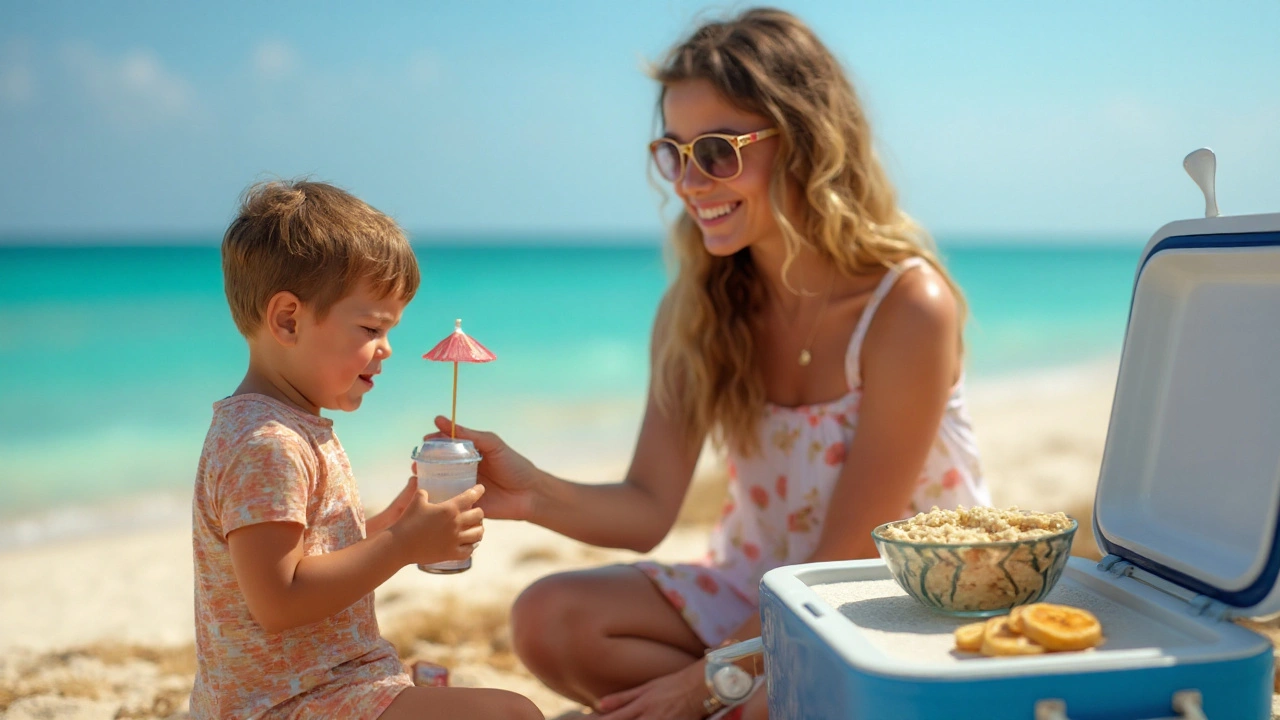 Sep, 24 2025
Sep, 24 2025
Nothing ruins a festive dinner faster than a sudden bout of acute diarrhea. Whether you’re at a Christmas brunch, a wedding reception, or a summer beach party, the rush to the bathroom can turn joy into panic. This guide shows you how to keep the fun alive by tackling the symptoms head‑on, staying hydrated, and knowing when professional help is needed.
What Is Acute Diarrhea?
Acute diarrhea is a short‑term condition marked by frequent, watery stools that typically last less than two weeks. It often stems from a viral or bacterial infection, food intolerance, or sudden changes in diet. The rapid loss of fluids can lead to dehydration, a serious risk especially when you’re away from home.
Why Holidays Make It Worse
Holiday gatherings bring three trouble‑makers:
- Rich, fatty, or spicy holiday meals that can overstimulate the gut.
- Increased exposure to foodborne illness caused by improperly stored or undercooked dishes.
- Travel and busy schedules that reduce time for proper hand hygiene the first line of defense against pathogens.
First‑Aid Steps When Symptoms Hit
- Find a clean bathroom as soon as possible. The less you hold it, the less irritation.
- Start rehydrating immediately - the body can lose up to 250ml of fluid per loose stool.
- Avoid caffeine, alcohol, and sugary sodas; they worsen fluid loss.
Rehydration Options - What Works Best?
The goal is to replace lost water **and** electrolytes (sodium, potassium, chloride). Below is a quick comparison.
| Solution | Sodium (mg/L) | Glucose (g/L) | Cost (USD) | Ease of Use |
|---|---|---|---|---|
| Commercial ORS (e.g., WHO packet) | 75 | 75 | 0.30 | Mix with clean water, ready‑to‑drink |
| Sports Drink (e.g., Gatorade) | 20 | 110 | 1.00 | Grab‑and‑go, but lower sodium |
| Homemade ORS (salt + sugar + water) | 75 | 75 | 0.05 | Requires measuring, but effective |
For holiday travel, keep a small packet of commercial ORS in your bag. If you’re at a family home, the homemade recipe (½tsp salt + 6tsp sugar dissolved in 1L clean water) works just as well.
Key Nutrients to Watch
While rehydrating, maintain electrolyte balance the ratio of minerals that keeps muscles and nerves functioning. Foods that help include:
- Bananas - rich in potassium.
- Plain yogurt - provides probiotics and gentle protein.
- Rice crackers - bland carbs that settle the stomach.
Avoid dairy (except probiotic yogurt), fried foods, and high‑fiber veggies until the stool normalizes.

Medication Guide - What’s Safe During a Celebration?
Two over‑the‑counter options are commonly used:
- Antimotility agents such as loperamide, which slow gut movement. Use only if you have no fever or blood in stool; they’re not for infections caused by invasive bacteria.
- Probiotics live cultures that restore gut flora. A daily capsule of Lactobacillus rhamnosus (≥10⁹CFU) can cut symptom duration by up to 30%.
Never mix antidiarrheal drugs with antibiotics unless directed by a doctor.
When to Call a Doctor
Most holiday episodes resolve in 24‑48hours with proper care. Seek medical attention if you notice:
- Fever over 38.5°C (101.3°F).
- Blood, mucus, or pus in stool.
- Signs of dehydration dry mouth, dizziness, reduced urine output, or a rapid heartbeat.
- Symptoms lasting longer than 72hours.
Emergency rooms often have IV fluids ready, but a primary‑care tele‑consult can arrange a prescription for a short course of antibiotics if a bacterial cause is suspected.
Preventive Checklist for Future Festivities
Turn the lessons from this episode into a pre‑holiday routine:
- Pack a hand hygiene kit (gel, wipes) and use it before meals.
- Check that all foods are cooked to safe internal temperatures (e.g., poultry 74°C/165°F).
- Bring a small ORS packet in your travel bag.
- Limit alcohol and caffeine to reduce extra fluid loss.
- Consider a probiotic supplement a few days before the event.
Related Topics You Might Want to Explore
If you found this guide helpful, you may also be interested in:
- Understanding traveler’s diarrhea common causes and preventive meds for trips abroad.
- How norovirus spreads in crowded settings and how to contain outbreaks.
- Choosing the right over‑the‑counter medication for different types of gastrointestinal upset.
Frequently Asked Questions
Can I use sports drinks instead of ORS?
Sports drinks contain electrolytes but usually have much lower sodium than WHO‑recommended ORS. They can help if you have no other option, but for severe fluid loss a proper ORS or homemade solution is more effective.
Is it safe to take loperamide if I have a fever?
No. A fever suggests an infection that the body is trying to clear. Slowing gut motility can trap pathogens, potentially worsening the illness. Use loperamide only when you have no fever or blood in stool.
How much ORS should I drink each hour?
Aim for 250‑500ml (1‑2 cups) per hour, adjusting for age, weight, and severity of symptoms. Children need smaller, more frequent sips.
Can probiotics shorten the diarrhea episode?
Clinical trials show that specific strains like L. rhamnosus GG or S. boulardii reduce duration by 1‑2 days in otherwise healthy adults.
When should I consider IV fluids?
If you can’t keep any fluids down, urine output drops below 500ml/24h, or you show signs of severe dehydration (dry skin, rapid pulse, confusion), head to urgent care for IV rehydration.
Is homemade ORS as effective as the commercial pack?
Yes, when measured correctly. The WHO formula (6g sugar, 2.5g salt per litre of water) matches the electrolyte profile of commercial packets.
Patrick Fortunato
September 24, 2025 AT 19:15Nothing like a busted gut ruining the craic at a family get‑together – grab a packet of ORS and get it over with before the kids start asking where the turkey went.
Manisha Deb Roy
September 26, 2025 AT 08:27Quick tip: the homemade ORS (½ tsp salt + 6 tsp sugar per litre) is just as good as the pricey sachet, so keep a little zip‑lock bag in your travel kit – saves cash and panic.
Helen Crowe
September 27, 2025 AT 21:39From a gastro‑physiology standpoint, rehydration kinetics hinge on sodium‑glucose cotransport (SGLT1) efficiency; thus, solutions with a 1:1 Na⁺:glucose molar ratio optimize water uptake.
Anthony Aspeitia-Orozco
September 29, 2025 AT 10:51It's interesting how many of us overlook the simplicity of electrolyte balance – the gut microbiota actually thrives when we restore potassium via bananas, which can modestly shorten the diarrheal phase.
Adam Dicker
October 1, 2025 AT 00:03Listen up, party people! If you feel the rumble, don’t wait for the line – dash to the nearest restroom, gulp that ORS, and keep the celebrations rolling. No one needs a bathroom break to steal the spotlight.
Molly Beardall
October 2, 2025 AT 13:15Honestly, that upbeat pep‑talk feels a bit tone‑deaf – most folks are too embarrassed to sprint to the loo mid‑toast, and shouting “keep the celebrations rolling” ignores the real anxiety of a public mishap.
Brian Pellot
October 4, 2025 AT 02:27For anyone worried about the taste, just add a splash of lemon or a few berries to your ORS – it masks the salty flavor and makes sipping more pleasant while you’re on the go.
Patrick McCarthy
October 5, 2025 AT 15:39Is coffee really that bad during a bout of diarrhea
Geraldine Grunberg
October 7, 2025 AT 04:51Great question, indeed! While coffee’s caffeine can increase bowel motility and exacerbate fluid loss, a small amount may be tolerated if you balance it with extra water and an ORS solution.
Elijah Mbachu
October 8, 2025 AT 18:03Just a heads‑up: if you’re traveling by car, keep a cooler bag with chilled ORS packets – the cold liquid feels soothing and can distract you from the urgency until you find a rest stop.
Sunil Rawat
October 10, 2025 AT 07:15In many Asian festivities, people use a simple salt‑water rinse called “Jivika” for quick rehydration; it’s essentially the same as the WHO formula and works great on the spot.
Andrew Buchanan
October 11, 2025 AT 20:27To clarify, the WHO oral rehydration solution contains 75 mmol/L of sodium and 75 mmol/L of glucose, which translates to approximately 2.5 g of salt and 13.5 g of sugar per litre of clean water.
Krishna Chaitanya
October 13, 2025 AT 09:39Wow I can’t believe how many people ignore the simple fact that staying hydrated is the #1 thing to do during a holiday tummy upset, it’s like common sense but no one follows it.
diana tutaan
October 14, 2025 AT 22:51Fact check: dehydration risk spikes when fluid loss exceeds 5 % of body weight, and without proper ORS the mortality rate can rise significantly, especially in vulnerable populations.
Sarah Posh
October 16, 2025 AT 12:03Remember, this too shall pass – a calm mind and steady sips of electrolyte solution will get you back to enjoying the festivities before you know it.
James Knight
October 18, 2025 AT 01:15Sure, “calm mind” is nice talk but if you’re still running to the bathroom every five minutes, no amount of positive vibes will fix the underlying infection.
Ajay D.j
October 19, 2025 AT 14:27When you’re at a big family event, try to wash your hands after handling raw meat – a simple habit that cuts down the chance of picking up a nasty bug.
Dion Campbell
October 21, 2025 AT 03:39One must admit, the article’s prose borders on the pedestrian, yet the medical content remains serviceable for the lay reader.
Burl Henderson
October 22, 2025 AT 16:51Indeed, while the narrative could be elevated, the inclusion of SGLT1‑mediated absorption data and precise electrolyte concentrations adds a commendable layer of scientific rigor.
Leigh Ann Jones
October 24, 2025 AT 06:03It is worth noting that acute diarrheal episodes, particularly in the context of holiday gatherings, often present a complex interplay of physiological, behavioral, and environmental factors that merit a comprehensive approach beyond mere symptom management. First, the sudden influx of rich, fatty foods can overwhelm the digestive capacity, leading to malabsorption and osmotic diarrhea. Second, increased social interaction raises the probability of exposure to viral agents such as norovirus, which thrives in crowded settings where hand hygiene may be compromised. Third, the stress associated with travel logistics and tight schedules can alter gut motility via the brain‑gut axis, exacerbating fluid loss. While oral rehydration solutions remain the cornerstone of therapy, the timing and composition of intake are critical; initiating rehydration within the first hour of symptom onset can halve the risk of severe dehydration. Moreover, adjunctive therapies such as probiotic strains Lactobacillus rhamnosus GG and Saccharomyces boulardii have demonstrated efficacy in shortening disease duration, provided they are administered in adequate colony‑forming units. Antimotility agents like loperamide should be reserved for cases without fever or dysentery, as their indiscriminate use may mask underlying pathology. Healthcare providers also recommend monitoring urine output, skin turgor, and capillary refill as practical bedside assessments of hydration status. In cases where oral intake is insufficient, prompt escalation to intravenous fluid therapy is justified to prevent electrolyte imbalances that could precipitate cardiac arrhythmias. Preventive measures, including the pre‑emptive consumption of a low‑dose probiotic and meticulous food safety practices, can substantially reduce incidence. Finally, educating guests about the importance of immediate hand washing after restroom use creates a protective barrier against cross‑contamination. In sum, a multi‑faceted strategy that integrates rapid rehydration, judicious use of medications, and proactive preventive habits offers the best defense against the disruptive impact of acute diarrhea during cherished celebrations.